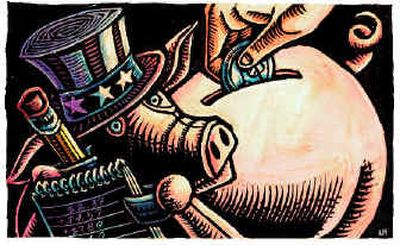The cost of a large tax refund may be bigger than you realize

It’s probably a bad thing that tax season arrives just at the time of year when a trip to someplace warm begins to seem like a necessity.
That tax refund feels like found money — kind of like winning the lottery, only smaller. Why not blow it on a fun vacation or some other little bit of luxury you would otherwise live without?
The problem is that an income tax refund isn’t someone else’s money that you’ve won. It’s your money; money you’ve been working hard for all year. Money that you could have been getting in your paycheck and using to pay your bills, or saving and earning interest on all year long.
If you’ve been using credit cards for purchases and carrying a balance on those cards, paying interest at a pretty hefty rate, the cost of that big tax refund is probably higher than you realize. Let’s say you’re getting a refund of $2,400. That’s an additional $200 a month you could have been getting in your paycheck.
If you’ve been spending that money anyway and adding to your credit card balance, at the end of the year you will have paid about $233 in interest to borrow money to substitute for that extra amount the IRS is holding. Meanwhile, the government has been collecting the interest on your money. Who’s the winner here?
Many people use tax withholding as a forced savings program, because they’re afraid they lack the self-discipline to save money on their own. If you’re one of those people, check to see if your employer offers direct deposit to your savings account. Even though interest rates on savings accounts are currently low, there is really no reason to let the government collect the interest on your savings.
If you do expect a big tax refund this year, consider using it to pay down credit card debt. The faster you pay debt off, the less interest accrues, which means more money in your pocket in the long run.
Then talk to your employer about reducing your withholding for 2005. If you don’t plan any major changes that will affect your taxes, simply divide the amount of your 2004 refund by the number of paychecks you get each year to determine how much less should be withheld. (If you do anticipate major changes or aren’t sure of the potential impact of any changes you’re making, talk to a tax advisor before adjusting your withholding.)
Use the difference to keep your credit cards paid off, or have it deposited directly into your savings account.
If you’re one of those who prefer to let the government hold your money because you think it’d be too easy to raid your savings account, it’s now possible to purchase U.S. Treasury securities by automatic payroll deduction. You can set up an account at www.treasurydirect.gov. That way, the government will at least be paying you interest on the extra money they’re holding.
If you’re not currently contributing the maximum to your 401(k), you might redirect the extra money in your paycheck to that fund; you could increase your return even more by taking advantage of company matching funds.
It might not be quite the same as a sunny day on the beach, but feeling that you’ve taken steps to gain control of your finances has a warmth all its own.